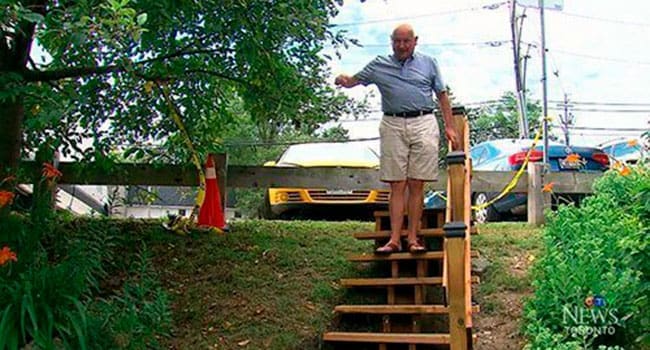 The folly of government spending can be broken down into eight little steps.
The folly of government spending can be broken down into eight little steps.
It’s an important lesson many Canadians have finally learned or one that’s been permanently reinforced, thanks to Adi Astl’s actions.
The 73-year-old retired mechanic was an unknown figure in the sea of humanity. He seemingly lived a normal life and never sought the spotlight. By his own description, he was “just a little guy” in the Greater Toronto Area.
Everything changed when he became involved in a matter related to a fairly steep and rocky hill in Etobicoke’s Tom Riley Park. People often used a rope to get down this unsafe pathway, sometimes leading to injuries.
For 10 years, Etobicoke residents near the park asked the city to build a staircase to prevent further accidents. Their pleas went unheard.
Astl decided to take action. He contacted his city councillor, Justin Di Ciano, for help. Di Ciano spoke with Toronto’s parks department and explained the situation.
The city tabulated the cost of building a staircase on the rocky hill. The price tag was, to put it mildly, insane: $65,000 to $150,000.
Astl was flabbergasted. As he told the Toronto Star on July 21, “It was crazy. This is only eight steps, not 100 steps and wide like Taj Mahal. For me, I said I can build this thing for almost nothing. I took a chance.”
On June 22, Astl and a homeless man – who, according to the National Post, “he met in the park … bought the man breakfast” and “paid him” for his work – built a wooden staircase with eight steps in no time flat.
The total cost for this short-term project: $550.
Neighbours were pleased, because the staircase was obviously much safer than the rocky hill and flimsy rope. Astl was proud of the work he had done. Word began to spread about his venture, reaching the Canadian media, as well as Fox News, CNN and the BBC.
Toronto Mayor John Tory, to his credit, acknowledged that the original city estimate was “absolutely ridiculous and out of whack with reality.” But he also told CTV News on July 19, “We just can’t have people decide to go out to Home Depot and build a staircase in a park because that’s what they would like to have.”
So city investigators examined Astl’s staircase and determined it wasn’t up to code. They tore it down on July 21 and immediately started the process of building a new staircase. It will cost no more than $10,000 – which is higher than what Astl paid (as he, and most people, would have expected) but far lower than the original city quote.
Toronto radio station Newstalk 1010 was so impressed with Astl’s initiative, it decided to cover his cost – and then some. He will receive a cheque for an appropriate amount: $1,010.
Why were so many people interested in this story?
That’s easy to figure out.
Every level of government wastes taxpayer dollars at a ridiculous rate. It frustrates residents, and makes them wonder if any politician or political party truly supports the concepts of fiscal prudence and responsible government spending.
While some individuals go against the grain – the late Toronto mayor Rob Ford, for all of his faults, comes to mind – they are few and far between.
Adi Astl took matters into his own hands. He became a modern-day David in the fight for fiscal responsibility against the government, or Goliath. He proved that, with a little bit of money and ingenuity, the little guy could fix a long-standing problem at a fraction of the cost that the big guy wanted to spend.
Heroes come in all steps and sizes, indeed.
Michael Taube, a Troy Media syndicated columnist and Washington Times contributor, was a speechwriter for former prime minister Stephen Harper. He holds a master’s degree in comparative politics from the London School of Economics.
The views, opinions and positions expressed by columnists and contributors are the author’s alone. They do not inherently or expressly reflect the views, opinions and/or positions of our publication.


It would help to get a look at the itemized account of what makes up even the $10,000 estimate. How much for material, labour, regulations, etc. That way people would see what their taxes are actually paying for.